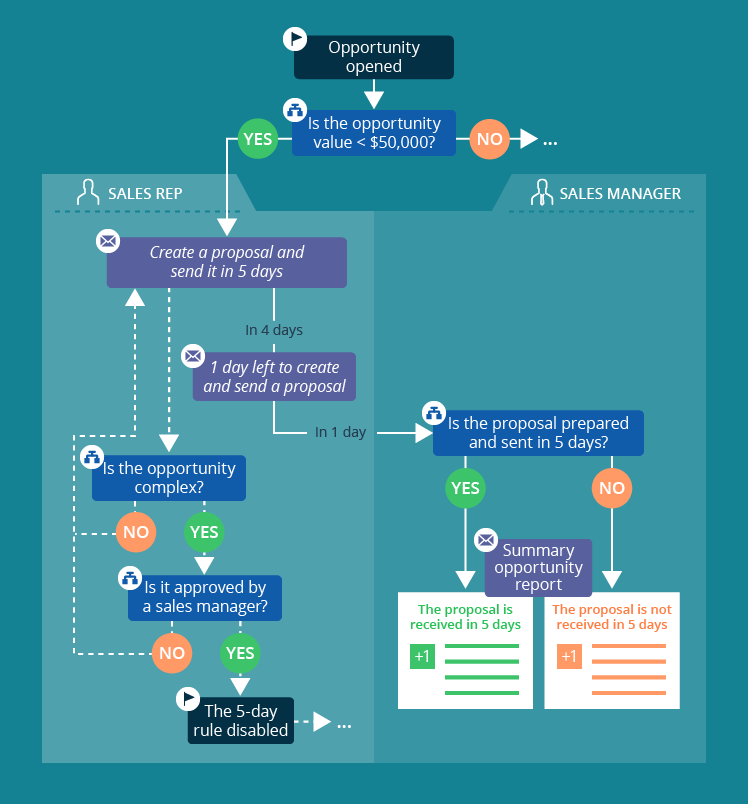Automating the sales process: An approach that works
Sales process automation, which implies managing various aspects of the sales process (e.g., customer outreach, proposal preparation) through introducing business rules into your CRM, can bring a truly positive change. The general benefit of an automated sales process includes overall productivity increase of the sales staff. As for the immediate benefit of a digitized sales process obtained by sales managers, it’s about providing easier control over the process’s execution. Sales reps, in their turn, can benefit from efficient guidance through the stages of the sales process, without having to focus on business rules, guidelines and policies (process automation includes reflecting them in CRM).
This article provides a comprehensive approach to sales process automation and shows how it helps different business types and CRM user groups.
Highlights:
- The value of SPA for B2B and B2C businesses
- How SPA supports sales reps’ and managers’ efficiency
- SPA: An outline of the approach
- Using the approach: an example of opportunity processing
- Afterword

The value of sales process automation for B2B and B2C businesses
Sales process automation has its benefits for different business types. For instance, it helps to satisfy the need for customer retention for B2C companies. CRM aggregates comprehensive info on customers and their purchasing habits creating a 360-degree customer profile. This helps to carry out efficient cross-selling and upselling campaigns and make selling through both online and brick-and-mortar stores more targeted. The opportunity to integrate CRM with a POS system, a customer portal and an e-commerce website is another way to back the efficiency of a B2C sales process. These integrations contribute to more effective omnichannel sales.
In case of B2B transactional sales, when the main aim is to increase the number of transactions and make sure they’re performed correctly, the possibility of quick response to the customer’s demands is of primary importance. A proper level of sales process automation allows CRM to speed up sales reps’ actions throughout the sales process, from processing a lead’s demand to prompt proposal preparation and following up on a prospect by an exact action plan reflected in CRM.
Automated communication with prospects, like emails and phone calls made in one click, helps sales reps with prompt responses and supports their productivity in general, allowing them to track all the steps in customer communication on the way to closing a deal.
B2B complex sales benefit from other CRM capabilities. With a long sales cycle and manifold decision-makers, it’s pivotal to gather comprehensive info about the deal (stakeholders and their motivation, competitors, etc.) in one place, and CRM allows to do it. CRM also helps to maintain regular customer communication keeping in touch with decision-makers all along the nurturing process. This is made possible with CRM tools for workflow automation. They make opportunity nurturing more efficient enabling scheduled phone calls, follow-up tasks and automatic updates of the opportunity records. Notifications about the results of the nurturing process and a visualized sales path allow tracking the efficiency of nurturing steps.
How sales process automation supports sales reps’ and managers’ efficiency
Sales process automation has its particular value for both sales managers and sales reps.
An automated sales process allows sales managers to keep its every aspect in control without taking excessive effort. Managers make up the pattern of their employees’ work, and CRM automation capabilities are used for implementing it. Sales managers especially value CRM for its help in embedding business rules, supervising how these rules are followed and guiding reps through the sales process. With the additional help of analytical tools, sales managers can estimate their reps’ performance within the business rules introduced in CRM, and to optimize the processes, when required.
As for sales reps, sales process automation helps them to focus on their first and foremost duty: selling. CRM streamlines manual time-consuming tasks sales reps have to do daily. It allows to spare the time for prioritizing leads, generating quotes or gaining approvals for discounts and dedicate this time to sales. CRM also reduces the need to manually enter the info on leads and opportunities on the part of sales reps, so the number of human errors decreases drastically. Higher productivity obtained with automation is supported by clear and logical workflows easy to follow with CRM’s help. Timely email reminders and follow-up tasks automated with CRM also help sales reps to work efficiently.
Sales process automation: An outline of the approach
Sales process automation is performed through embedding business rules into your CRM, which requires taking specific business needs and sales-related problems into account (for instance, approval functionality allows to introduce one-step or multistep discount approval processes). To make your business truly benefit from digitized sales processes, we propose the approach that embraces the needs of both sales managers and reps. Here’s the brief outline of the approach, showing how exactly these needs are seen to:
- Ensuring the transparency of the process for a sales manager.
- Preventing a sales manager’s information overload.
- Enabling multiple reminders for sales reps.
- Allowing exclusions from the rule for sales reps.
Using the approach: an example of opportunity processing
Let’s consider the above approach working on a real-life example. Imagine a sales manager in a large company. After auditing their sales team’s work results, they notice that their reps tend to lose a lot of opportunities with a value less than $50,000. The sales manager realizes that the percentage of small opportunity loss is high due to the prolonged proposal preparation. It takes 9 days on average, which is enough to see these small opportunities taken by other vendors. To streamline the process and ensure the needed quick response, the sales manager introduces a rule that all opportunities with a value less than $50,000 should get a proposal within 5 days after the opportunity is opened. But if the manager tries to enforce this rule manually (for example, using internal policies and sales guidelines only), the duty to control this rule’s execution will lie on their shoulders.

Let’s see how automating a part of the sales process (namely, preparing a proposal) using the approach outlined above works with Salesforce, a leading tool for sales force automation according to the Gartner’s Magic Quadrant report. The process of automation comprises the following strategy elements:
-
Setting up the rule
Introducing business rules in CRM can be done with manifold tools. For the rule in the example, let’s consider using Process Builder available in Salesforce Sales Cloud. In Process Builder, a process consists of a criterion, a trigger, and actions executed after the criteria node evaluation. These actions can be immediate (happening right after the criteria are evaluated as true) and scheduled (executed at the specified time).
Using Process Builder for our 5-day rule allows the sales manager to set the criteria (“the opportunity value
-
Ensuring the transparency for a sales manager
Having an automated business rule in place helps sales managers to make a sales process more consistent. And what CRM tools reflect how this process is followed?
In our example if the proposal isn’t prepared and sent in 5 days after a small opportunity is marked as open, the manager gets another notification about it. For this, another rule is introduced in CRM. This helps the sales manager to stay-in-the know about how their reps are performing, whether the rule works as intended, or not.
Introducing reports for the opportunities with a value less than $50,000 can add even more visibility into their processing. One general report should contain the list of small opportunities grouped into 2 categories “Got the proposal in 5 days” and “Didn’t get the proposal in 5 days”. Another report should show the exclusions not eligible to the rule.
-
Preventing a sales manager’s information overload
Our example describes a rule for a sales process with lots of opportunities that fit the value criteria. These opportunities can create enough notifications to overload the sales manager. To curb the information overload, a UX should be designed for CRM to inform about the rule’s violations but not about every single violation separately. Grouping notifications into digests instead of sending one by one can help to reduce their number. Pointing out rule violations with the reporting tools can be enabled in addition to alerts, making important cases immediately visible and providing a broad picture of reps’ performance.
-
Enabling multiple reminders for sales reps
Besides having the automated process, sales reps should be helped to stick to it.
In our example, setting up two email notifications prior to the deadline gives sales reps time to execute the rule. The proposal should be ready within 5 days, which means that the first notification should be delivered on the day after an eligible opportunity is marked as “open.” If 4 days have passed, and the proposal still isn’t sent, another notification should come.
-
Allowing exclusions for sales reps
However good the introduced rule is, following it blindly isn’t an option. In our example, some opportunities may be complex, which makes them hard to comply with the rule. Their complexity can be manifested in the customer’s specific requirements, like special warranty conditions or terms of payment. Such cases require extra time and effort to get the proposal ready. Thus, the sales manager should provide a standard way to shift the deadline for proposal preparation. Adding a custom checkbox “Complex” to the opportunity records allows reflecting the specificity of some opportunities in CRM, allow disabling the notifications for the 5-day rule and set up a separate approval process for these complex opportunities instead.
For this, a sales rep can mark an opportunity as “Complex”, which triggers an email to the sales manager with a request to prolong the term of proposal preparation. Adding a “Request approved” checkbox dependent on the “Complex” checkbox, and enabling its automatic update within the approval process allows additional visibility for sales reps. In this case, if the manager approves the request, and if the sales rep misses an email notification about it, they’ll see the approval’s state in this checkbox.
In case the manager needs additional control over complex opportunity cases, they may resort to auto-generated reports. The reports should reflect the number of complex opportunities per every sales rep, and show the percentage of complex opportunities of all the opportunities a sales rep has. If a certain sales rep has, say, 40% of complex opportunities or more, the manager may suspect cheating (when a sales rep deliberately marks a regular opportunity as complex as an excuse for the delay).
Another way to see violations and their reasons is adding a custom field to the complex opportunity records. This field contains a drop-down list of reasons for the impossibility of preparing a proposal and space for manually entering the reason if none of the proposed ones suits. The options from the list or the info manually entered by sales reps will allow their manager to see the reasons for violating the rule, and cope with potential cheating too.
Afterword
Having CRM doesn’t mean getting the sales automation job done. To shape an automated sales process within your CRM, sales managers should first map out the rules for their employees to follow. Besides, CRM should be tuned so that sales managers can see the necessary information about following the rule and manage the processes without taking excessive effort. Sales reps, in their turn, can become more productive due to receiving timely reminders and having a possibility to get an exclusion from the rule in special cases. Such a comprehensive approach to sales automation helps to make your sales process easy to manage and follow, which contributes to higher productivity of your sales staff.

